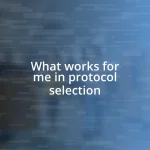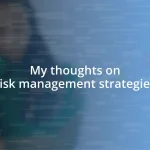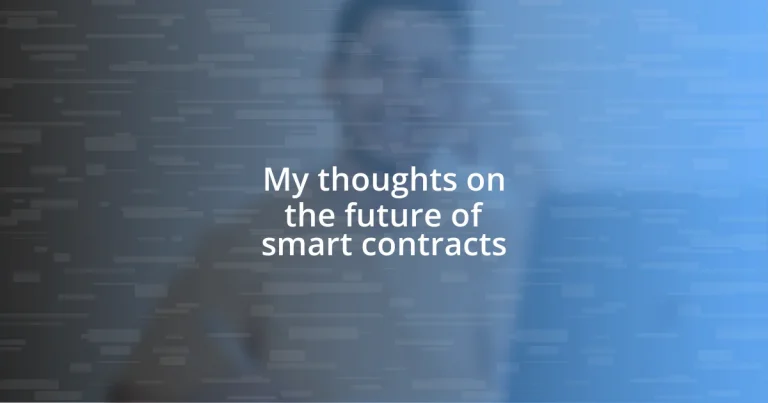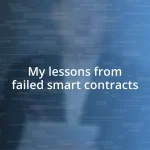Key takeaways:
- Smart contracts simplify transactions, enhancing speed, accuracy, and transparency while reducing human error.
- Current applications of smart contracts span diverse sectors, including finance, supply chain, insurance, and healthcare, improving efficiency and trust.
- Challenges such as interoperability, legal recognition, and security vulnerabilities need to be addressed for widespread adoption of smart contracts.
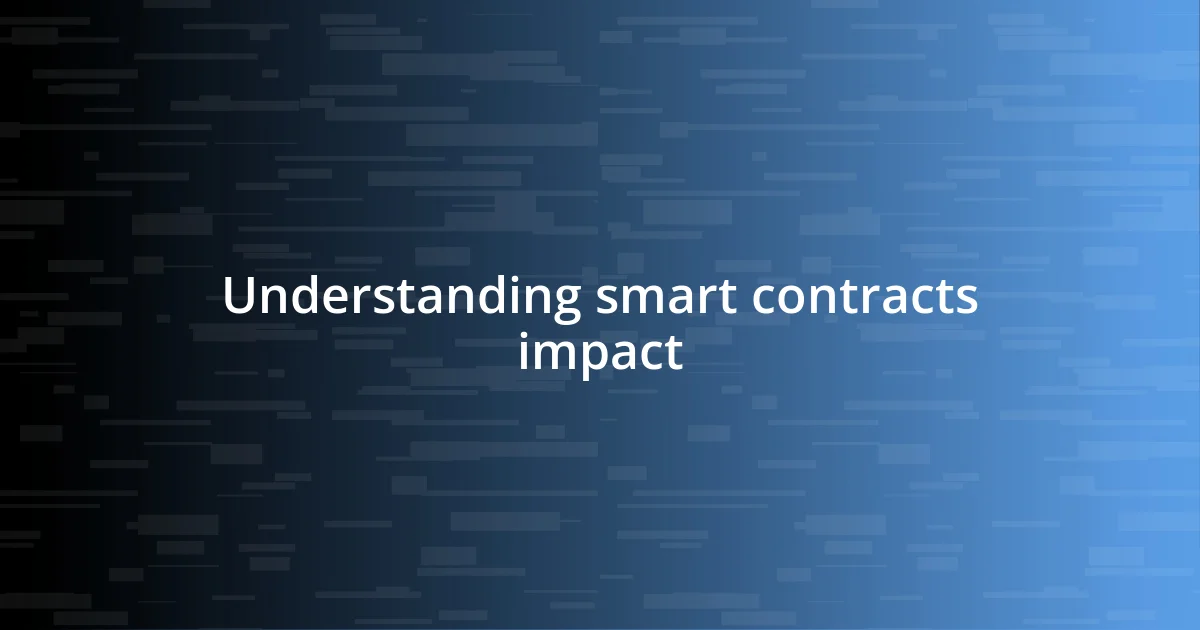
Understanding smart contracts impact
Smart contracts, at their core, simplify the way we conduct transactions. I remember when I first learned about them; it felt like discovering a cheat code for the complexities of traditional agreements. Isn’t it fascinating how a program can execute a contract automatically when certain conditions are met? This not only saves time but reduces the risk of human error, making our dealings more efficient.
The impact of smart contracts stretches beyond just speed and accuracy; it also enhances transparency. Imagine a world where both parties can view the same information without doubts or misinterpretations. This brings an incredible sense of trust that’s often missing in transactions today. Have you ever felt hesitant to enter an agreement due to fear of hidden clauses? With smart contracts, those concerns can be significantly alleviated.
Moreover, smart contracts have the potential to redefine entire industries, from finance to supply chain management. I find it thrilling to think about how they can automate processes previously mired in red tape, like escrow services or insurance claims. What if we could eliminate the delays caused by paperwork? The possibilities are exciting, and I can’t help but wonder how far we will go as these technologies evolve.
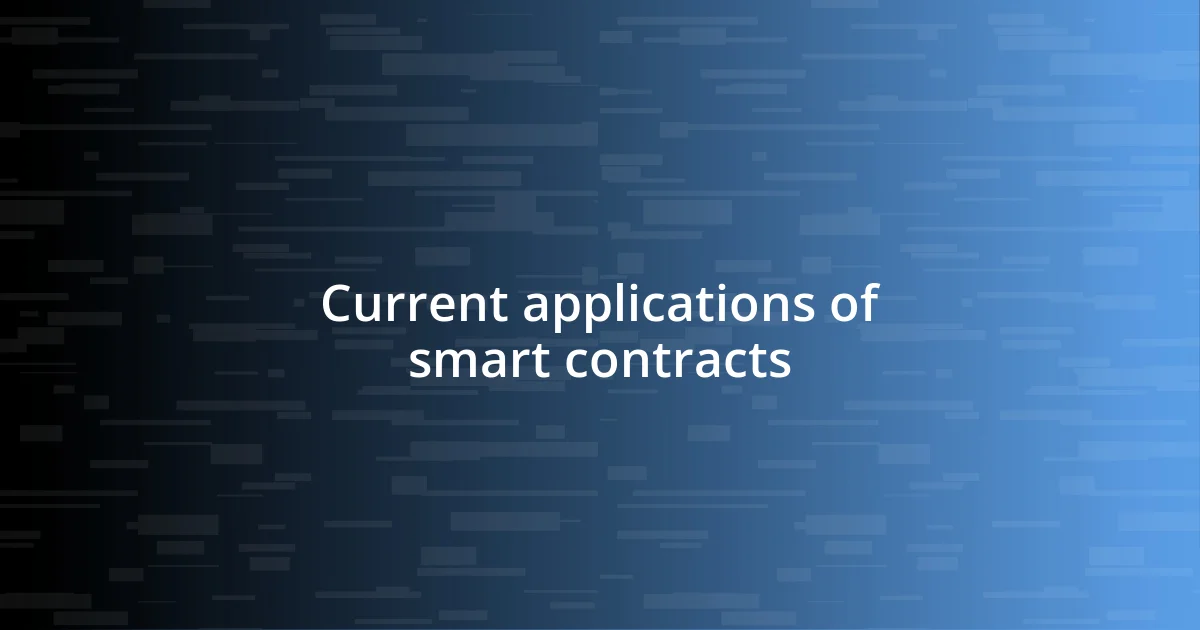
Current applications of smart contracts
The current applications of smart contracts are diverse and impactful, touching various sectors in ways I didn’t expect when I first encountered the concept. One application that caught my attention is in the realm of real estate. Imagine buying a home and eliminating the painstaking waiting period for escrow to finalize. With smart contracts, funds can securely transfer to sellers the moment all conditions are met, streamlining the entire process. It feels as though technology is finally living up to its promise of simplifying life.
Here are some current applications of smart contracts:
- Finance and Banking: Automating transactions, reducing fraud, and increasing efficiency in lending.
- Supply Chain Management: Tracking goods in real-time, verifying authenticity, and ensuring compliance.
- Insurance: Automating claims processing based on predetermined conditions, speeding up payouts.
- Intellectual Property: Protecting copyrights and automating royalty payments through transparent tracking.
- Gaming: Ensuring fair play and ownership by executing rules and rewards automatically within games.
I also remember a friend excitedly sharing how smart contracts could revolutionize the healthcare sector by giving patients control over their data. Their ability to enable secure sharing of medical records, contingent upon patient consent, really resonated with me. It’s a beautiful prospect—where patients feel empowered, and healthcare providers can access vital information without the cumbersome bureaucracy. Just thinking of how these elements intertwine fills me with hope for a more efficient future.
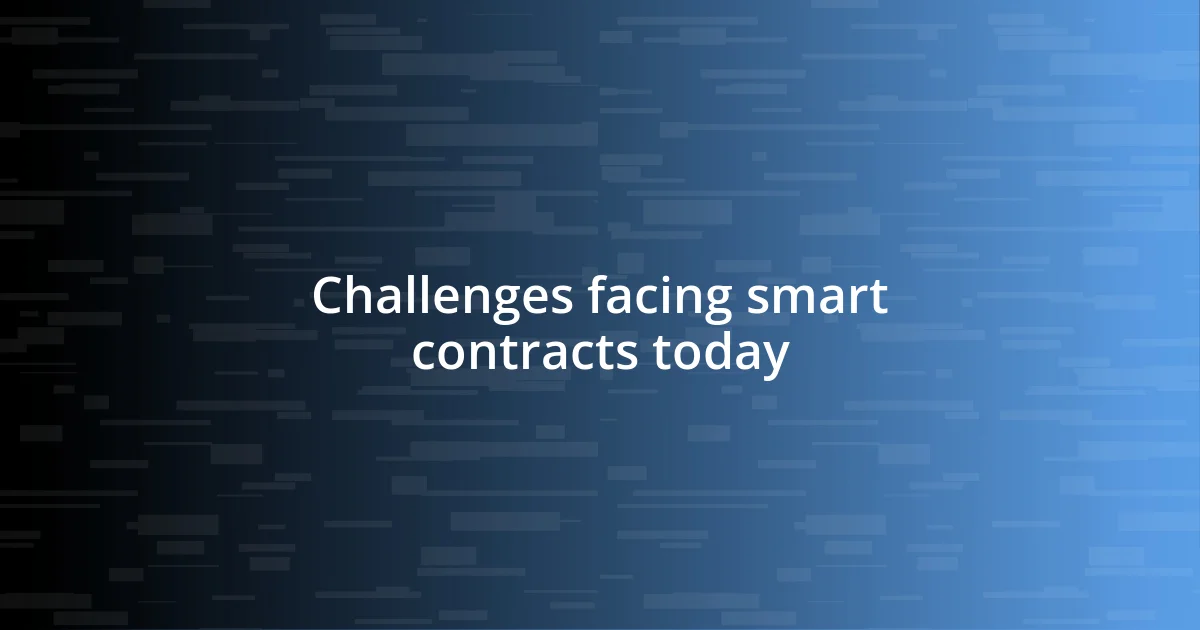
Challenges facing smart contracts today
Smart contracts face several challenges that can hinder their widespread adoption. For instance, interoperability remains a significant issue. I once attended a tech conference where developers expressed frustration over the inability of smart contracts to communicate across different blockchain networks. This disconnect can lead to inefficiencies, limiting the seamless integration of these contracts in a globalized digital economy. Don’t you think it’s essential for these technologies to speak the same language?
Another pressing challenge is the legal recognition of smart contracts. It’s interesting to see how jurisdictions vary in their approach. I remember reading a case study highlighting a situation where a smart contract executed a series of transactions flawlessly, yet the court still questioned its validity due to a lack of legal frameworks. This raises an important question: how can we expect companies to fully embrace smart contracts if the law doesn’t provide them with the necessary security and clarity?
Lastly, there’s the issue of security vulnerabilities. In my early days exploring blockchain technology, I was captivated by its promise of security. But then, I stumbled upon reports of high-profile hacks targeting vulnerabilities in smart contracts. It was a stark reminder that while the technology holds incredible potential, it’s crucial to ensure robust coding practices and thorough audits. After all, what good is a revolutionary contract if it can easily be breached?
| Challenge | Description |
|---|---|
| Interoperability | Difficulty in seamless communication across different blockchains reduces efficiency. |
| Legal Recognition | Varied legal frameworks make smart contracts uncertain in some jurisdictions. |
| Security Vulnerabilities | Potential bugs can lead to exploits, undermining confidence in the technology. |
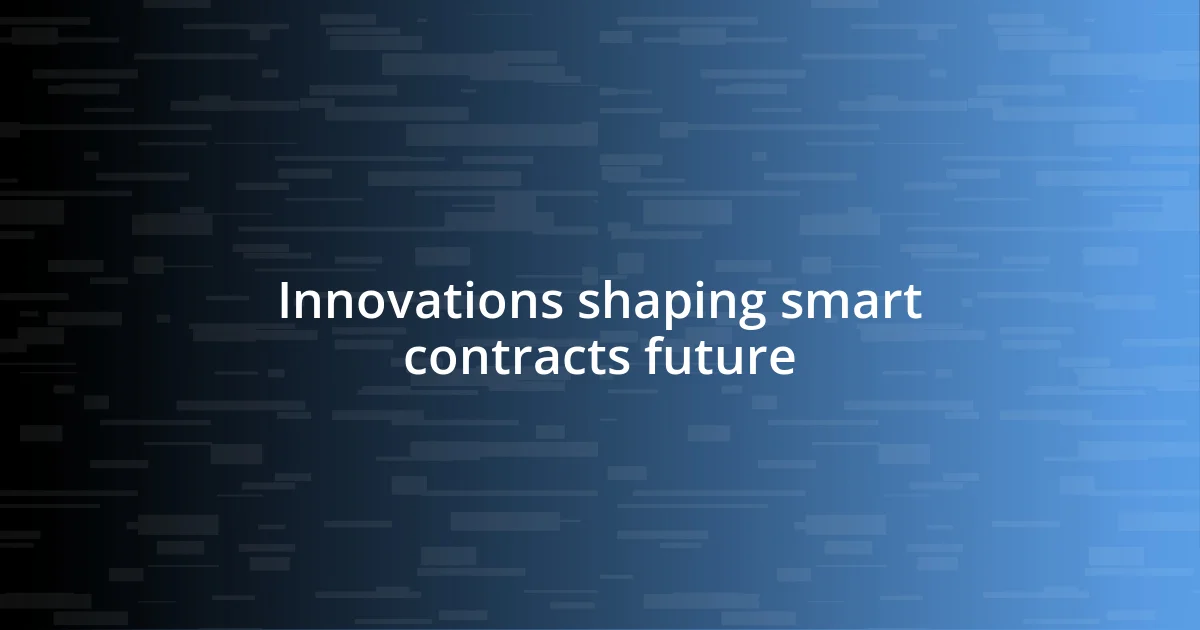
Innovations shaping smart contracts future
Innovations shaping the future of smart contracts are popping up all over the place, and I can’t help but feel excited about what’s on the horizon. One standout trend is the integration of artificial intelligence (AI) into smart contracts, allowing them to learn and adapt over time. I often think about how this could transform the way agreements are executed—imagine a contract that can recognize and respond to subtle changes in market conditions or even human behavior. Doesn’t that change the game entirely?
Then there’s the rise of decentralized finance, or DeFi, which is reimagining how we think about financial systems. While exploring DeFi applications myself, I was amazed to see how these innovations create opportunities for individuals who were previously excluded from traditional banking. This shift toward inclusivity not only impacts personal finance but also fosters trust in the entire ecosystem. Have you ever considered how empowering access to financial instruments can be for countless people?
Finally, I find the evolution of blockchain technology to be incredibly inspiring. As scalability solutions like layer-two networks gain traction, our ability to process transactions quickly and cost-effectively will become a reality. I can’t help but feel optimistic when I think about a future where smart contracts can handle thousands of transactions per second. This innovation might just unlock new industries riddled with inefficiencies today. Isn’t it fascinating to ponder the possibilities that lie ahead?
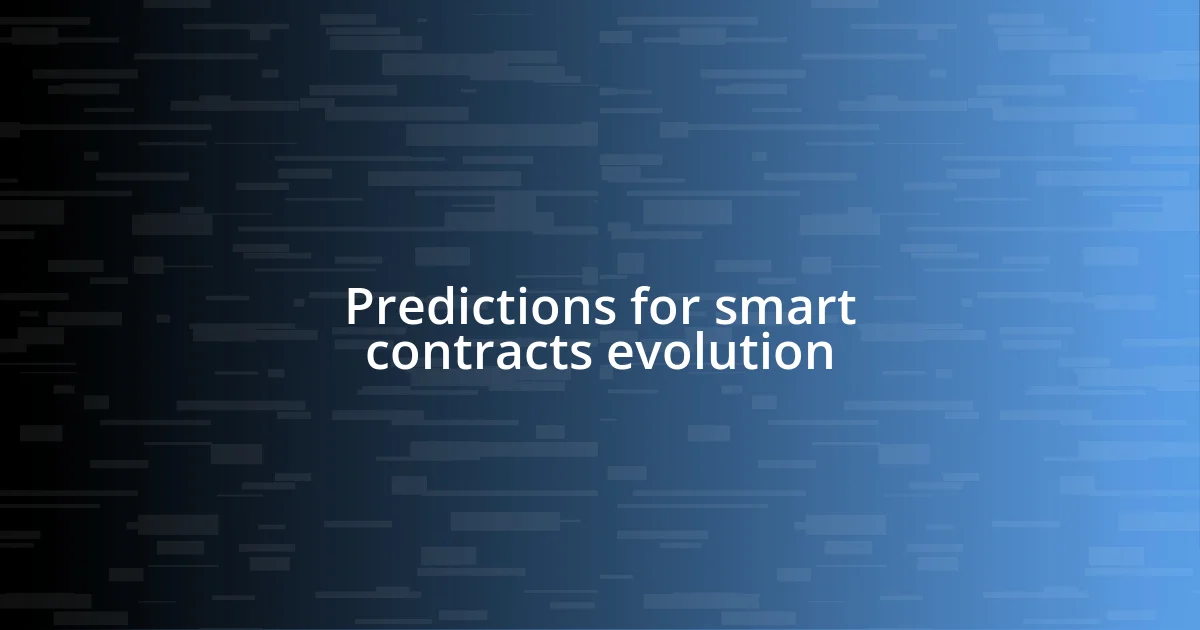
Predictions for smart contracts evolution
As I look to the future, I believe smart contracts will experience significant evolution, particularly through enhanced interoperability. I recall a recent conversation with a blockchain developer who passionately outlined how creating standardized protocols could bridge the gap between different networks. Imagine a world where contracts seamlessly interact, making transactions smoother and opening doors to new possibilities. Wouldn’t that be a breakthrough for global commerce?
Another exciting prediction is the potential for more robust legal frameworks and clearer regulations surrounding smart contracts. I remember attending a panel discussion where legal experts expressed hope for progressive legislation that could integrate smart contracts into existing legal systems. If governments recognize and support this technology, it could offer businesses the clarity they need to invest confidently in smart contract solutions. How reassuring it would be for enterprises to operate within a legally secure environment!
Lastly, the demand for heightened security measures will inevitably influence smart contract innovation. I once heard a cybersecurity expert explain how multi-signature protocols could mitigate risks by requiring multiple approvals for critical contract functions. This idea struck me as a practical approach, especially considering the ongoing concerns about hacks. As the landscape evolves, wouldn’t it be comforting to see layered security becoming the standard, boosting user trust in smart contracts?
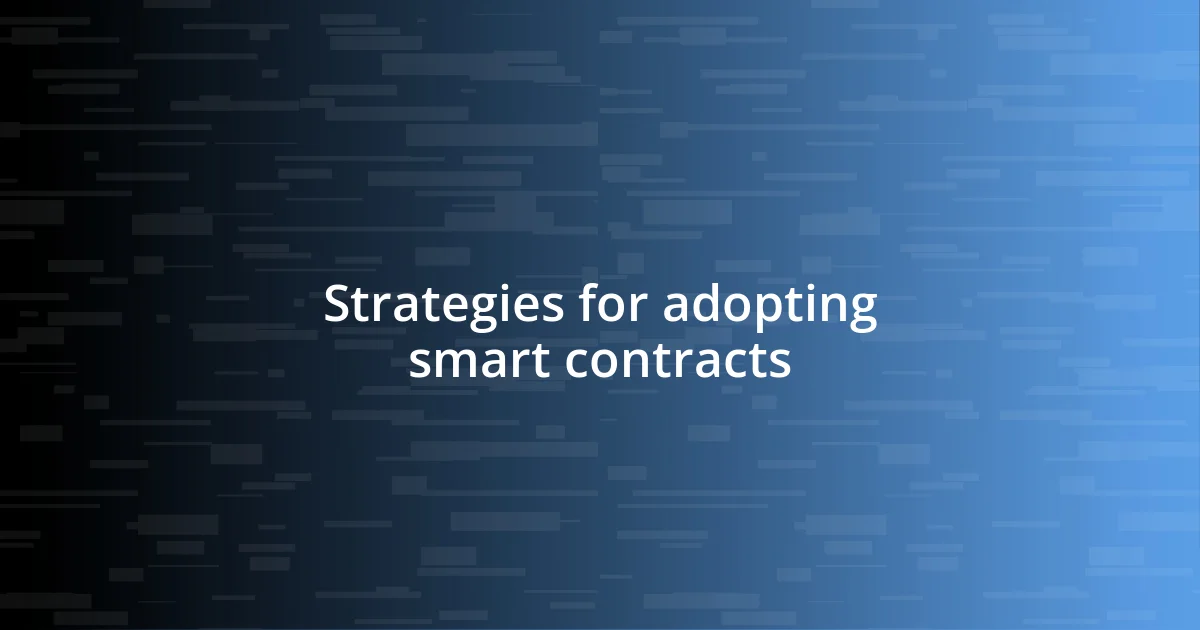
Strategies for adopting smart contracts
When considering strategies for adopting smart contracts, I think it all starts with education. I recall my early days exploring blockchain technology; the sheer amount of information was overwhelming. Taking time to understand the underlying principles of smart contracts can empower teams to recognize their potential fully. Have you ever found that diving deep into a new subject opens up a whole new world of possibilities?
Next, I believe that starting small is vital. I was once involved in a project where we implemented a basic smart contract for a single function, and the insights we gained were invaluable. This incremental approach allowed us to learn and adapt without overwhelming ourselves. Seeing the tangible benefits in a real-world application can be a compelling way to build confidence in more complex implementations.
Finally, collaboration is key. I’m always amazed at how much can be learned from connecting with others in the field. Engaging with experts or joining a community can provide practical insights into best practices and pitfalls to avoid. Have you ever noticed how collaborative discussions often lead to innovative ideas? Embracing this strategy can create a supportive environment for successful adoption, fostering the growth of smart contracts throughout various industries.




